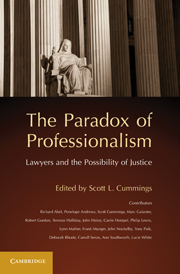Book contents
- Frontmatter
- Contents
- List of Tables and Figures
- Contributors
- Preface and Acknowledgments
- 1 Introduction
- PART I LAWYERS AND THE PUBLIC GOOD: THE FUNDAMENTAL DILEMMA
- PART II LAWYERS AND THEIR CLIENTS: DETERMINANTS OF ETHICAL PRACTICE
- PART III LAWYERS AND SOCIAL CHANGE: MOBILIZING LAW FOR JUSTICE
- 14 Epilogue
- Index
- References
14 - Epilogue
Just Law?
Published online by Cambridge University Press: 05 June 2012
- Frontmatter
- Contents
- List of Tables and Figures
- Contributors
- Preface and Acknowledgments
- 1 Introduction
- PART I LAWYERS AND THE PUBLIC GOOD: THE FUNDAMENTAL DILEMMA
- PART II LAWYERS AND THEIR CLIENTS: DETERMINANTS OF ETHICAL PRACTICE
- PART III LAWYERS AND SOCIAL CHANGE: MOBILIZING LAW FOR JUSTICE
- 14 Epilogue
- Index
- References
Summary
Can law promote justice? Or is it just law – a set of positive directives, which are obligatory if created according to Hart's secondary rules but likely to be followed only if the benefits exceed the costs? What makes law distinctive as a subject of social scientific inquiry is its normative essence (a quality it shares with religion). Disregarding instructions for assembling an Ikea bookcase or installing software on your computer can lead to failure and frustration, but such behavior usually does not incur disapproval. Exceeding the speed limit or evading taxes deserves opprobrium. People do not always behave like Holmes's “bad man,” or economists' profit maximizer, simply calculating the costs of noncompliance in terms of the sanctions likely to be imposed. Law is obligatory because it is just. That law is aspirational, seeking to promote justice, fundamentally shapes our research agenda. It explains why studies of the “gap” between law on the books and law in action have long been a staple of law-and-society scholarship. It explains why the “hired gun” theory of legal ethics is so unsatisfactory and why each new cohort of law students experiences discomfort at relinquishing moral autonomy for a career devoted to promoting the ends of clients lawyers generally do not choose. It explains the persistent concern with the unequal distribution of legal services and continuing efforts to increase government spending on legal aid, expand pro bono activities, and sustain law students' commitment to public interest law.
- Type
- Chapter
- Information
- The Paradox of ProfessionalismLawyers and the Possibility of Justice, pp. 296 - 318Publisher: Cambridge University PressPrint publication year: 2011
References
- 1
- Cited by



